Take special considerations when celebrating the holidays with your fur babies.
Christmas is just around the corner. By now, many of us have already put up holiday decorations around the home. It is also the time when we see fur parents posting photos of their beloved pets playing with the Christmas tree, ornaments, and other decors on social media.
Albeit funny, some of these items can cause harm to your fur babies. To avoid this, here are some ways to make Christmas pet-friendly.
Choose a pet-safe Christmas tree
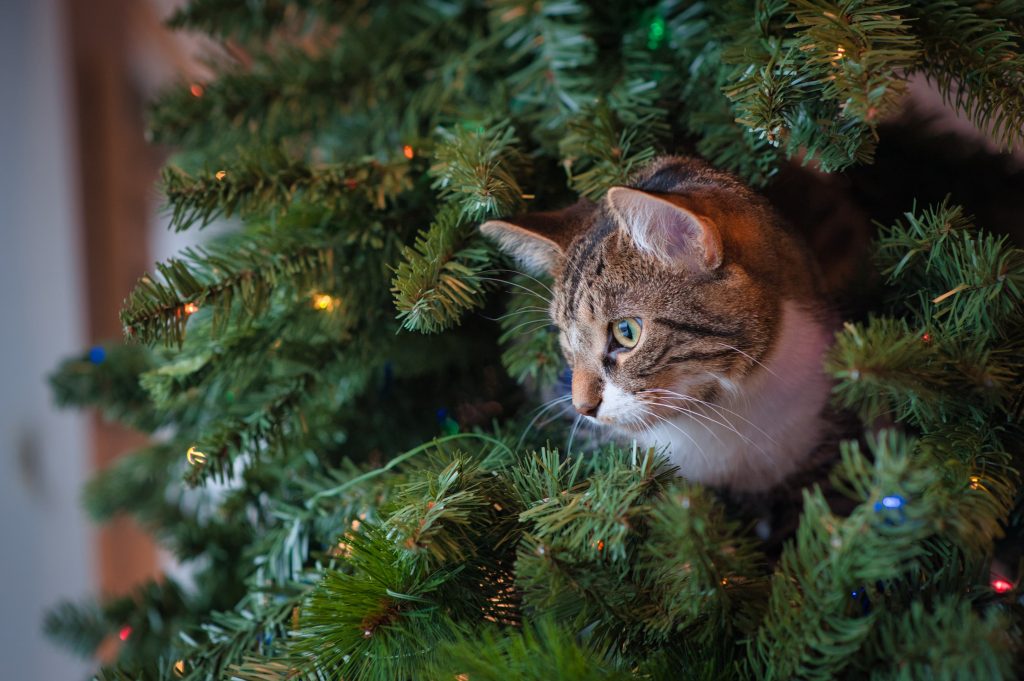
Live Christmas tree
If you ordered a live Christmas tree this year, know that the oils of fir, spruce, and pine trees can irritate the pet’s mouth and lead to excessive drooling or vomiting. If ingested, the needles can cause gastrointestinal irritation, vomiting, obstruction or perforation of the intestines, and even damage to the eyes or corneal laceration should pets run into the tree. In addition, cut trees require water and preservatives to keep them fresh longer. The chemicals in these preservatives can make the water poisonous to drink if left uncovered.
Solution: Create a barrier between the tree and your pet, always sweep the floor for fallen pine needles and branches, cover the tree stand to prevent pets from drinking the fertilized or medicated water, snip off branches that are too low or place the tree in an area where it’s inaccessible for pets.
Flocked tree
Though a flocked tree looks beautiful and reminiscent of Bing Crosby’s White Christmas, flocking can still be harmful to pets if consumed. Most flocking or holiday snow is made from cellulose. If this is consumed in large amounts, it could cause blockage to the intestines.
Solution: Place tree in a corner to prevent cats from jumping into it or dogs from sniffing around it. Anchor trees securely so that your tree will not fall over. If possible, go for flock-less trees.
Artificial tree
Most artificial trees are safe for pets. However, as the tree ages, some of its parts may become brittle and fall off. This can be dangerous to curious pets that will ingest these, causing mouth irritation or intestinal blockage.
Solution: Check the age and condition of your tree; lookout for any signs of brittleness, cracks, and loose or missing parts. If the tree can no longer be repaired, it’s time to consider replacing it with a new one.
Pet-proof Christmas tree decorations
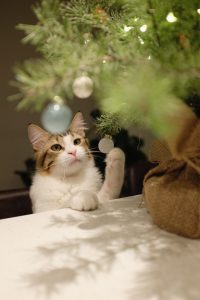
Ornaments
Forego the edible and expensive glass Christmas ornaments. Edible Christmas ornaments include stringed popcorn, ornaments made from cookies, candies, and nuts; and the like. A whiff of these delectable decors would draw your pets to the tree and eat these, potentially knocking over the tree and possibly hitting them. Glass ornaments, on the other hand, are very fragile. They break easily and the shattered pieces are sharp enough to cut skin, or puncture intestines when ingested and possibly lead to death.
Solution: Go for Christmas ornaments that are one-piece, non-breakable, and made of non-toxic material. These should also be too big to be swallowed and out of reach by curious pets. If you must use your glass ornaments, hang these instead in places where pets will not reach these or use these to decorate holiday wreaths.
Christmas lights
Some Christmas lights get hot after being turned on for a while, which could burn pets if touched. Some pets also get attracted to wires and chew on these like one of their toys. Chewed electrical cords can cause burns, electric shocks, and are a fire hazard.
Solution: String lights inside of the tree rather than on the tips of the branches. For extension cords and the like, tape these in a position that is inaccessible to your fur babies or put hot sauce or anything that tastes bitter to prevent them from chewing it.
Poinsettias
Poinsettias are popular plants during the holidays. These plants evoke the holidays’ festive spirit thanks to their bright red leaves, but they are also mildly toxic to dogs and cats — not poisonous. The milky white sap found in this plant contains diterpenoid euphorbol esters and saponin-like detergents. Though not poisonous when ingested, pets could suffer from mild signs of vomiting, drooling, or diarrhea (but this is a rare occurrence). If the sap touches the skin, though, it could cause redness, swelling and itchiness. Exposure to the eye can also cause mild irritation.
Solution: Place your poinsettias in locations that they can’t reach. Cats do not like anything citrus; spray lemon oil on the plant’s leaves or on the area surrounding it. Or keep poinsettias in a people-only room, meaning pets are not allowed to go in these rooms.
Keep gifts away from pets
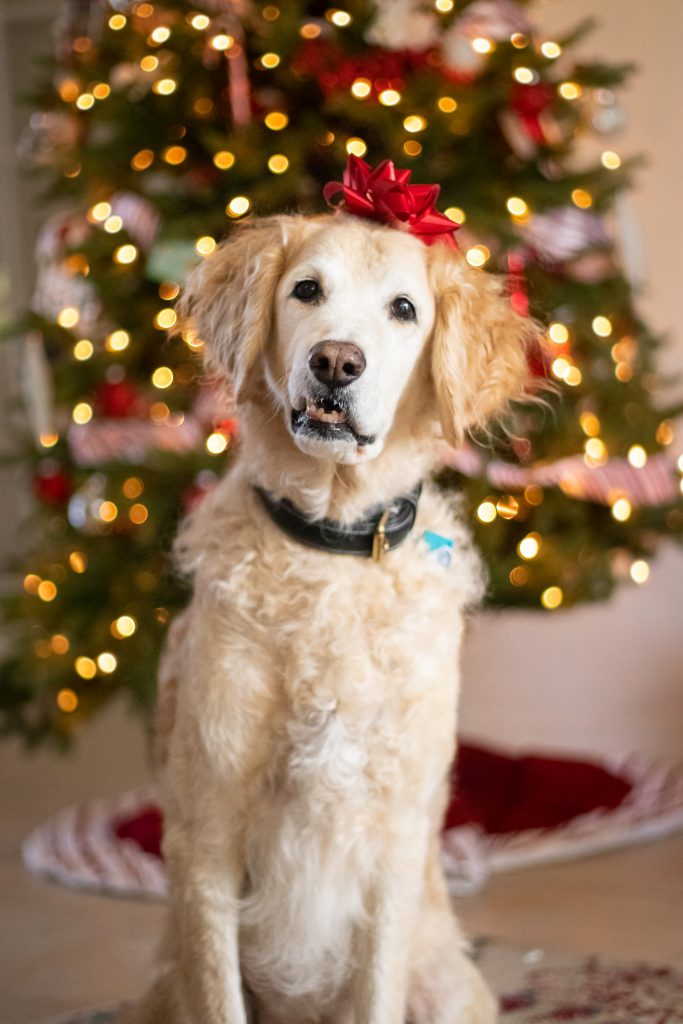
When it comes to wrapping gifts, keep pets away from your wrapping area. The paper, string, ribbon, and other wrapping essentials could be troublesome for pets and cause intestinal blockages. Scissors are also not pet-friendly as these can cut them.
Solution: When giving pets gifts, wrap these with animal-friendly wrapping paper rather than traditional ones. Traditional Christmas wrappers are usually treated with chemicals that give these their bright and colorful sheen. Be aware when fashioning your pets with a decorative ribbon collar, as these may become a choking hazard. Be careful when using glitter, as well.
Provide a safe space for pets
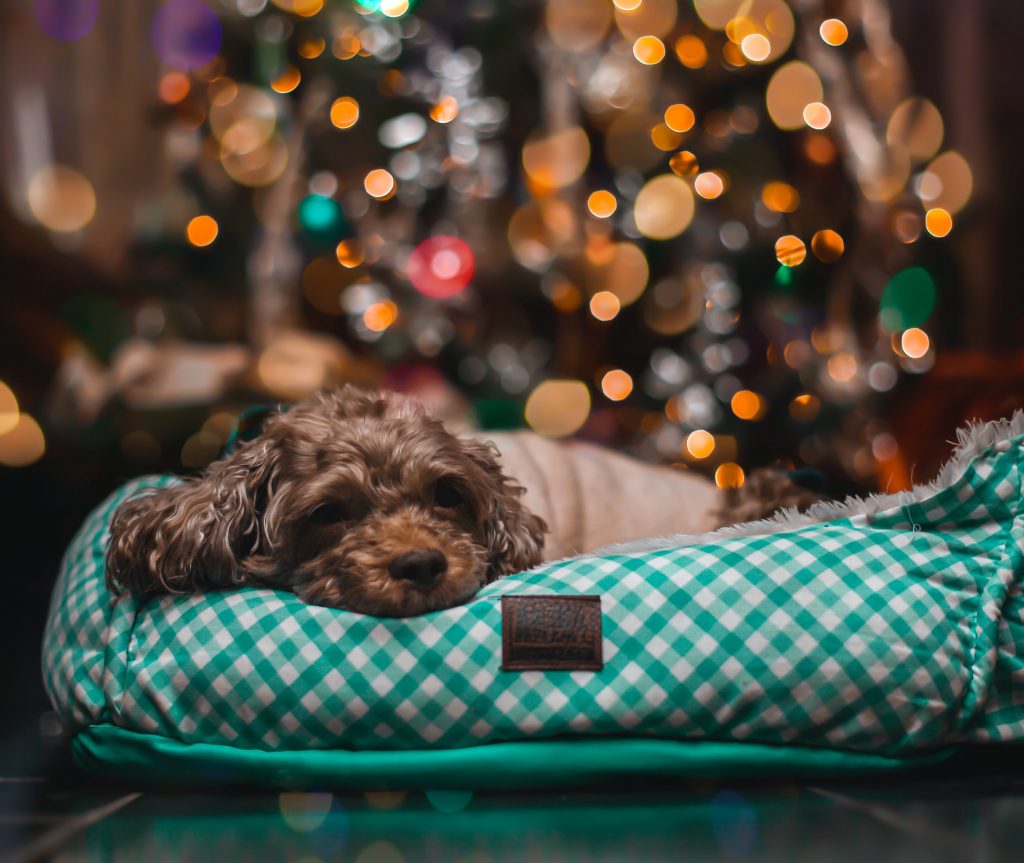
If you are going to host a party, consider the number of guests and the amount of noise. In addition to this, some towns, cities, and shopping malls have firework displays, which could cause stress and anxiety for our furry loved ones.
Solution: Provide a safe space for your pets. Set up a separate room for them and add essentials such as water, food, their favorite toys, a soft bed, and relaxing music playing in the background.
Do not give pets food they’re not allowed to eat.
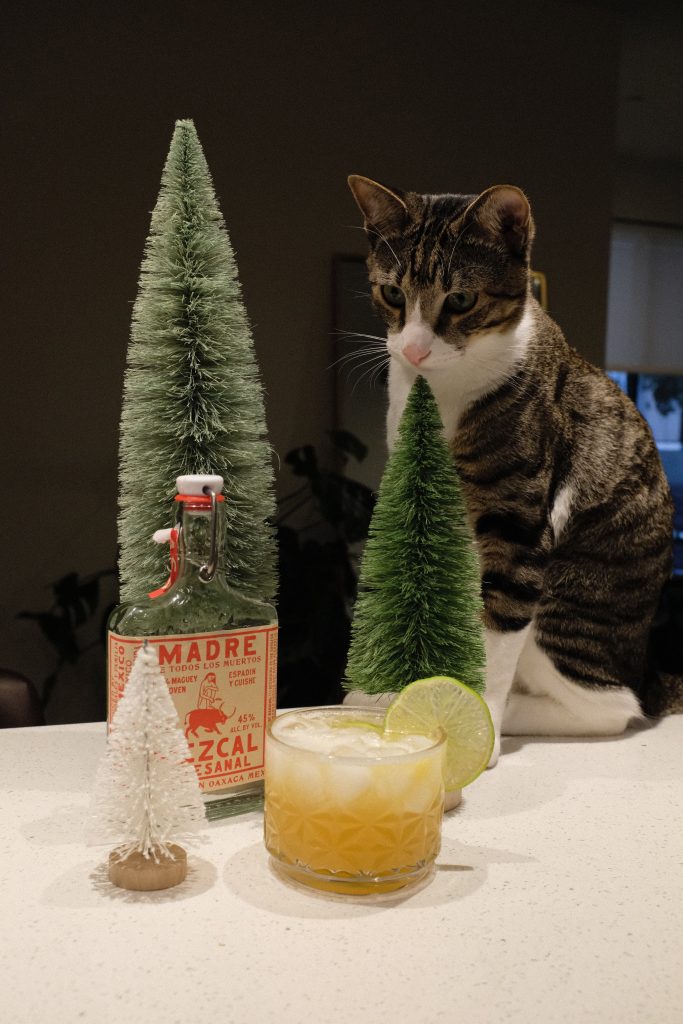
Speaking of parties, without a doubt, the Noche Buena is the favorite part of Christmas for most Filipinos. But be wary when giving pets’ food or leftovers from the feast. Do not give them the following:
Fatty food – When animals eat foods that are rich and fatty, it could lead to inflammation of the pancreas. The pancreas becomes over-stimulated and over secretes enzymes that cause inflammation to the organ and the surrounding tissues.
Bones – Bones can become lodged in the mouth or throat of your pet. There is also a risk that bones could puncture the stomach and intestines.
Chocolate – Chocolate is fatal to dogs and cats because of a compound found in chocolate called theobromine. This causes vomiting, diarrhea, heart irregularities, muscle tremors, seizures, and coma, leading to fatal results.
Coffee or anything with caffeine – Caffeine is a stimulant, and dogs are more sensitive to it. So when dogs ingest a handful of coffee beans or tea bags, it could have the same effects as chocolate.
Raisins, currants, and grapes – Grapes, raisins, and similar items, including food items that contain these are toxic to dogs and can cause kidney failure. If you don’t like fruit cakes, do not give these to your pets.
Macadamia nuts – Whether by themselves or mixed into cookies and cakes, these nuts cause severe illness in dogs, including weakness, depression, tremors, vomiting, and increased body temperature.
Anything that has garlic, chives, and onion – They are all poisonous to dogs and can cause stomach and gut irritation, which could lead to red blood cell damage and anemia. Onions are particularly toxic to dogs.
Blue cheese – Like those dips for chips and chicken wings, blue cheese contains a substance called roqueforine C, which dogs are sensitive to. This substance may cause vomiting, diarrhea, tremors, twitching, seizures, and a high temperature when eaten in large amounts.
Alcohol – Do not leave alcoholic drinks on the floor or low lying tables. When consumed, even small quantities of it, alcoholic beverages can cause vomiting, diarrhea, decreased coordination, central nervous system depression, difficulty breathing, tremors, blood changes, coma, and death.
Take special considerations when it comes to your pets to ensure that everyone — even pets — get to enjoy the holidays.
